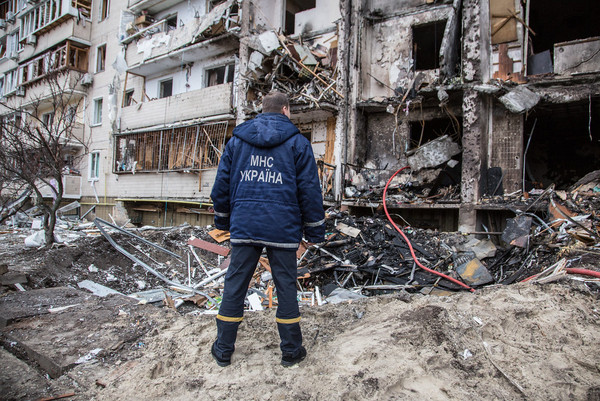EASPD to set up 6 Regional Offices to help refugees with disabilities relocate

The European Association of Service providers for Persons with Disabilities (EASPD) is setting-up 6 temporary regional offices to help coordinate the welcoming and relocation of refugees with disabilities from Ukraine. This is in response to a request by the Ukrainian Government, the huge numbers of refugees with disabilities arriving in the border countries, and the need to find suitable accommodation and support services across Europe for refugees with disabilities, their families and carers. EASPD has launched a fund-raising initiative to finance this process and help refugees with disabilities to relocate across Europe.
The Russian Federation’s invasion of Ukraine has brought war back into Europe after decades of peace. Approximately 3.5 million persons living in Ukraine have now left in search of refuge and safety. Over 6 million people in Ukraine have also been internally displaced. Persons with disabilities, including children, are particularly at risk. This is in large part due to the increased difficulties in getting to safety at both shelters and safer areas within and outside of Ukraine. 10,000s of persons with disabilities also live in very large residential institutions, very often without family support and – in the current situation – without adequate professional support.
As soon as the onset of the invasion, EASPD’s members have gone beyond their usual activities and have rapidly been activated in support of Ukraine. Financial support has been provided to key organisations from Ukraine. EASPD members in bordering countries have been active in welcoming people with disabilities from Ukraine, including in Poland, Hungary, Slovakia, Romania, Bulgaria and Moldova; complementing the work of Humanitarian organisations, public authorities and all stakeholders involved. Their capacity however is reaching its limits. Service providers from other countries are offering financial and material support, as well as opening housing and support services to welcome refugees with disabilities. There are already examples of this in France, Germany, the Netherlands and Austria. Safe and appropriate solutions through matching persons with disabilities andtheir families with housing and support services, is needed, available and feasible. The Ukrainian government has requested EASPD to support it in its efforts.
EASPD is opening Temporary Regional Offices (TROs) to better coordinate the relocation process for persons with disabilities from Ukraine, particularly those in institutions, to other countries. Relocating is extremely complex and requires appropriate resources due to the significant number of refugees involved, the requirements of people with disabilities (accessibility, specific support needs, medicine, etc) and their families in such processes, the lack of pre-existing expertise on these issues, and challenges around coordination between Civil Society Organisations and public authorities from across Europe.
Maya Doneva, EASPD Secretary General, affirmed the purpose behind the creation of these Temporary Regional Offices (TROs),: “EASPD has the capacity to connect people with disabilities and their families from Ukraine with housing and support service providers from across Europe. This is already happening, but too slowly and with huge difficulty. What we miss right now is boots on-the-ground to coordinate these cross-European efforts. This is why we are setting up TROs for EASPD as the best way to make a real difference to this conflict.”
In the coming days, six TROs will be set-up in Poland, Romania, Moldova, Slovakia, Hungary and Bulgaria. These TROs will be:
- Liaising with and coordinating between local organisations in the region who are providing support for refugees with disabilities.
- Ensuring that humanitarian aid reaches persons with disabilities who are in Ukraine, displaced persons with disabilities within Ukraine, refugees with disabilities and their caregivers and families.
- Coordinating logistical support and material donations towards their regions and Ukraine.
- Coordinating with disability services who are able to provide housing and support elsewhere in Europe and linking them with refugees with disabilities who are currently located in their region.
- Communicating with EASPD’s European office for common efforts in supporting persons with disabilities and organisations on the spot.
- Gathering information for local needs and getting info from EASPD on correct matches from members and partners of EASPD.
- Remaining in communication with other TROs to be able to coordinate activities as and when is appropriate.
On the creation of these six TROs, Jim Crowe, EASPD President, says “EASPD is connecting refugees with disabilities and support services. But we need the resources to make us more effective and better coordinated. This is why we make a call for donations to a dedicated account we have set-up. Each euro will go in support of Ukrainians with Disabilities, their networks and of the people as well as the NGOs acting locally to find soloutions. We are also working with the EU institutions and other partners to get appropriate funding for this truly European initiative.”
For more information on our activities and how to donate, please visit this page. If you are a service provider and are able to host refugees with disabilities in your facilities, please contact us.
Supporting Documents:
- Webinar recording: Persons with Disabilities in Ukraine: What you can do to help
- EASPD Webpage on the invasion of Ukraine
- Click here to support EASPD's work
- Social organisations you can support right now
Please contact:
Thomas Bignal
Head of Policy
thomas.bignal@easpd.eu
+32 2 233 77 23
Note to editors:
The European Association of Service providers for Persons with Disabilities is a non-profit European umbrella organisation, established in 1996, and currently representing over 20,000 social and health services for persons with disabilities. EASPD advocates effective and high-quality disability-related services in the field of education, employment and individualised support, in line with the UN CRPD principles, which could bring benefits not only to persons with disabilities, but to society as a whole.
Image licensed under the Creative Commons Attribution 4.0 International license. Attribution: President.gov.u
Image licensed under the Creative Commons Attribution 4.0 International license. Attribution: UNDP Ukraine

